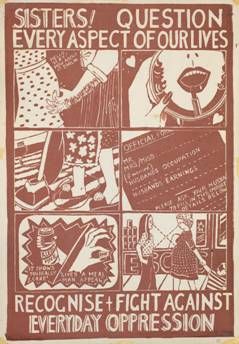
Não sei se foi por estar mais atenta, mas em 2013 no Dia Internacional da Mulher ou Dia Internacional das Mulheres, como tantos e tantas preferem, contactei, na minha avaliação, com trabalho interessante, útil, sério e de qualidade. Pensamos que faz sentido continuar a partilhar aqui o que encontrámos, umas vezes sem procurar, mas outras indo atrás ... e de que ainda não escrevemos. Agora é a vez de «Sisterhood and After: the Women's Liberation Oral History Project» a que podemos aceder na British Library.
Desde já: «Should boys and girls be educated together or separately? Does gender influence career choice? Should women be paid to do housework? Are masculinity and femininity opposites? What do women from different races and classes have in common? How do they differ?
The women you will meet on this site took on these and other questions in an extraordinary period of British history. They strove for political and social equality, and struggled for changes that would grant both women and men new freedoms. On this site, you can learn about what they fought for, what they achieved and how they achieved it.
These stories are illustrated by oral history recordings and films that capture the voices of women at the forefront of the Women’s Liberation Movement in the 1970s and ‘80s. By talking about their lives, our interviewees respond to thorny political questions in their own personal ways. The Women’s Liberation Movement prided itself upon its lack of stars and a variety of views. There is no one history of feminism, but many, just as there is no one women’s movement but many. The full interviews from our Sisterhood and After: The Women’s Liberation Oral History Project can be accessed here.
Explore the site to discover the continuities and changes that have marked women’s struggles for equality and expression over time, and to ask your own questions about feminist histories and futures.
Due to the nature of the campaigns that were and are important to women’s equality, some of the audio clips on this site deal with challenging subjects and may not be appropriate for some younger students».
A parte sobre a Cultura e as Artes: Changing Cultures and the Arts. Ilustração, no domínio da literatura: «The Women’s Liberation Movement opened doors for women in literature. Women’s publishing houses and magazines such as Virago, The Women’s Press and Spare Rib sprang up. Change happened in more complex ways too, through the creation of a new and broader sense of what was culturally valuable. These ideas fuelled and supported literary and aesthetic revolutions among women writers in the 1960s, ‘70s and ‘80s, with many now classic texts being created at that time». +
E para se ter uma ideia mais global do projeto, talvez ir ao Press Release da British Library a propósito da sua divulgação no dia 8 de Março de 2013: neste endereço. Não é dificil imaginar projetos a partir do Sisterhood and After: the Women's Liberation Oral History Project», e para isso ... só trabalhando de forma partilhada, em colaboração. E há que encontrar financiadores. Como este: The Leverhulme Trust.


Sem comentários:
Enviar um comentário